Tiebreak drama at 2025 FIDE World Cup in Goa: Niemann and Oro eliminated
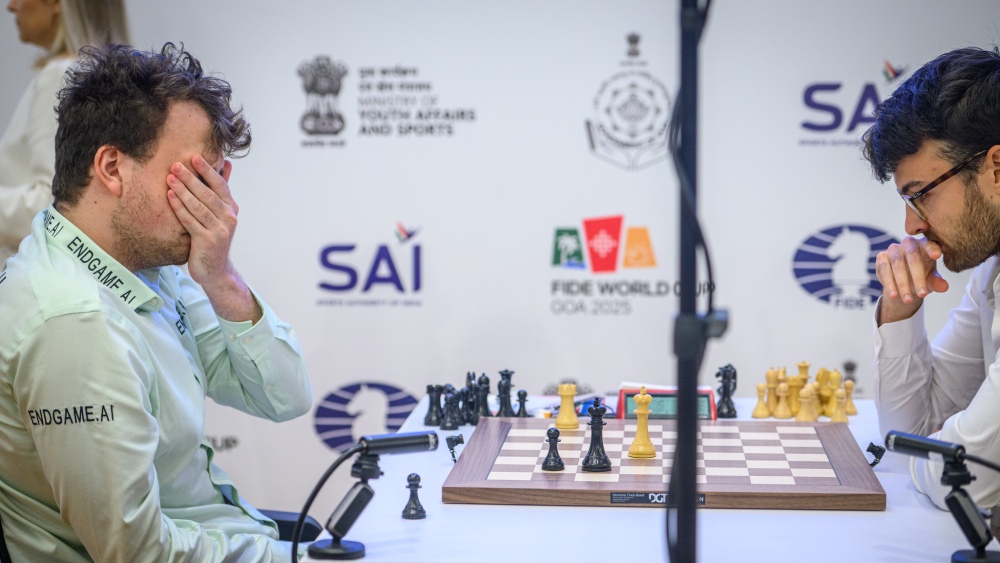
When the best player in the world – former World Champion and 2023 World Cup winner Magnus Carlsen – decides to set everything aside and join the live broadcast, you know the tiebreaks are going to be massive. And they didn’t disappoint! Favourites fell, prodigies stumbled, and the round delivered everything a chess fan could wish for: seven matches going all the way to blitz and even one Armageddon decider. The atmosphere in Goa was electric. Even Ian Nepomniachtchi’s mild post-elimination complaints on Telegram after Round Two were quickly forgotten when another top player addressed the issue directly. “The conditions are fine here,” said Vidit Gujrathi, who had just eliminated Argentine prodigy Faustino Oro. “You can always get a few complaints when you organize a big tournament. He could have been more specific, but I think people are being too harsh on him. Maybe he just lost and said something emotional – I’ll give him the benefit of the doubt. But regarding the conditions, I don’t see any reason to complain.” The Round 2 tiebreaks were officially opened by Mahesh Candolkar, President of the Goa Chess Federation, and Dr. V. Candavelou, Chief Secretary of Goa, who performed the ceremonial first move on Board 1. Rapid 15/10 The shock of the first rapid session came from the elimination of GM Hans Moke Niemann (2738). The American 10th seed was defeated by Italy’s GM Lorenzo Lodici (2560), who held him to two classical draws before winning the first of the two 15-minute rapid games in what was arguably one of the day’s key moments. Lodici seized a decisive advantage earlier, but Niemann appeared to believe he could still draw. Short on time, Niemann blundered with 72…Rg1? – just one square too far! The sequence 73.f6 Rf1 74.Be3! was the point as Black had no Rg1+. After 74…Rf3 75.h7+ Kh8 76.f7 the deal was sealed, 1-0. The only move for Black was 72…Rg2! Compared to the line above after 73.f6 Rf2! 74.Be3 (Bc1) he has the saving check 74…Rg2+. Visibly frustrated, Niemann took some time alone to review the lines on his phone before leaving the venue. Meanwhile, Faustino Oro’s dream run came to an end against Vidit Gujrathi, who prevailed in the first set of rapid games. “I was a bit worried going into tiebreaks — Faustino is very good, and I hadn’t played much rapid lately,” said Vidit. “I tried my best, prepared well, and it worked out.” FIDE’s Charlize van Zyl interviewed Vidit after the match — don’t miss the video! https://www.youtube.com/watch?v=ANF6L47_S7k After the match, Oro reflected to this author: “I fell behind on the clock in the second game and couldn’t recover.” Despite his disappointment, he left Goa with valuable experience and a growing fan base. Meanwhile, Nodirbek Abdusattorov, Shakhriyar Mamedyarov, Stamatis Kourkoulos-Arditis (pictured below), Sam Sevian, Daniel Darhda, Bogdan-Daniel Deac, Radoslaw Wojtaszek, Vladislav Artemiev, Pranesh M, Pranav V, Robert Hovhannisyan and Shamsiddin Vokhidov all won their matches at this stage, qualifying for Round 3. Rapid 10/10 The second set of rapid games (10 minutes + 10 seconds) proved even tougher: only three of the ten undecided matches were resolved. GMs Gabriel Sargissian (2611) and Shant Sargsyan (2664) both advanced after long, evenly matched fights against Maxim Rodshtein (2611) and Jorge Cori (2601) respectively. Former World Rapid Champion GM Daniil Dubov (2674) also moved on, defeating GM Jinshi Bai (2595). The Chinese player had neutralized Dubov’s advantages through four games, but a critical error in the Exchange Slav. 12…g4? – cost him dearly. After 13.Bh4! gxf3 14.Bxf3, Bai’s knight on h5 was doomed, and Dubov converted comfortably. Blitz 5/3 Seven matches came down to blitz (5 minutes + 3 seconds). The most dramatic included GM Praggnanandhaa R (2771) overcoming GM Temur Kuybokarov (2535) after falling behind and levelling the score in the first rapid set. In the decisive blitz game, Kuybokarov reached an overwhelming position, but first failed to find a couple winning continuations and then missed a draw. After 37.b6! cxb6 38. Rc1 White’s c-pawn is simply unstoppable. Temur, however, played 37.Rd7? Kf7 38.Bxe7?? (White was still winning after the precise 38.Bd4!) 38…Rxe7. Here Kuybokarov missed a simple defensive resource 39.Rd4, playing 39.Re1?? instead. After 39…Rxd7 40.cxd7 Rxh4+! 41.Kg2 Rd4, the Australian GM was forced to resign – a heartbreaking end to an excellent match. Elsewhere, GM Nikita Vitiugov (2654) bowed out to GM S. Narayanan (2617), who won both 5/3 games after six straight draws in the classical and rapid portions. Blitz 3/2 Two matches went to the final blitz stage (3 minutes + 2 seconds). As expected, the veterans’ clash between GM Ivan Cheparinov (2626) and GM Michael Adams (2635) lived up to its billing. In a show of precision and stamina, Adams won both games, advancing to Round 3 – another deep run in his illustrious career. Armageddon The last and most dramatic tiebreak saw GM Rauf Mamedov (2655) face GM Rasmus Svane (2614). Under the new bidding system for the Armageddon decider, Mamedov bid 3:00, while Svane chose 3:13, thereby securing White. “We were both struggling with the black pieces, me even more than him, so I bid slightly higher to ensure White,” Svane later explained. The decision paid off. Svane converted a slightly better endgame into victory — one of the biggest wins of his career. Looking ahead Sixty-four players remain as Round 3 begins. With three Candidates spots at stake, every match is critical. The field is wide open – and if the tiebreaks were any indication, the coming rounds promise even more spectacular battles. The full pairings for Round 3 matches can be found here [HERE]. Game One of Round 3 will be played on November 7 at 3 PM local time. The action can be followed live on the FIDE YouTube Channel, featuring expert commentary by GMs Evgenij Miroshnichenko and Jan Gustafsson. To watch the games in person, tickets can be purchased [HERE] Official website: worldcup2025.fide.com/ Written by IM Michael Rahal (Goa, India) Photos: Michal Walusza and Eteri Kublashvili
FIDE World Amateur Chess Championship 2025 kicks off in the Vrnjacka Banja, Serbia
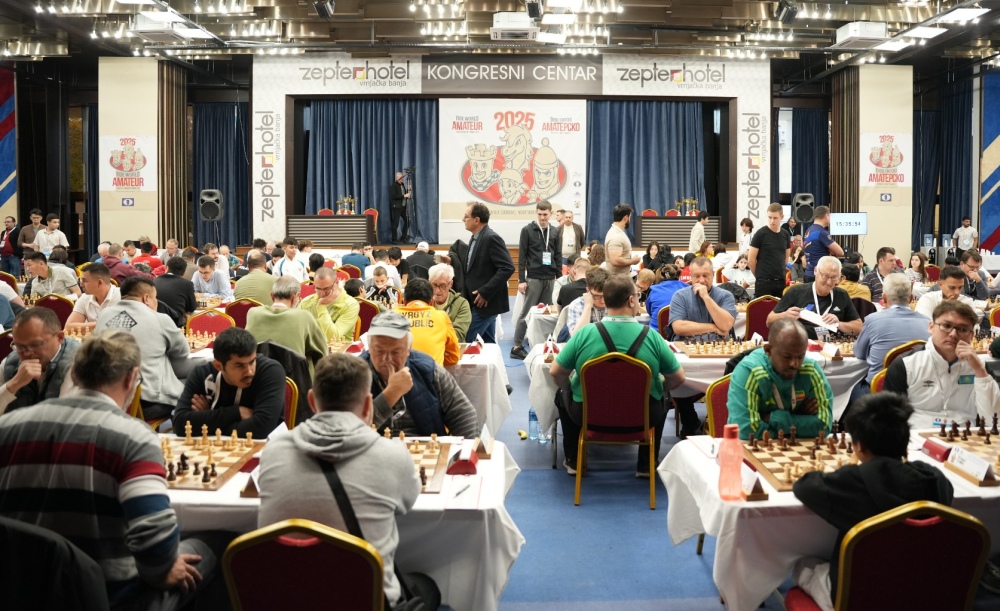
The FIDE World Amateur Chess Championship was officially opened in Vrnjačka Banja, Serbia. The event, held across three rating categories – U1700, U2000, and U2300 (both Open and Women’s sections) – has brought together around 300 players from over 50 countries. All competitions are nine-round Swiss tournaments with a classical time control. The opening ceremony took place in the hall of the Zepter Hotel and began with the national anthem of the Republic of Serbia, performed by the city choir Abrašević. The audience was then welcomed by Jasmina Trifunović, representing the Municipality of Vrnjačka Banja; Özgür Solakoğlu, representative of FIDE; and Andrija Jorgić, President of the Chess Federation of Serbia. “We are proud that Vrnjačka Banja has become one of the centers of chess events by organizing the European Individual Championship, the European Club Cup, the European Club Cup for Women, and the FIDE World School Chess Championship. Chess has become part of our cultural identity. In our Central Park, in a symbolic space we call the Chess Corner, stands a statue of the chess queen, unveiled in honor of this ancient game and of Vrnjačka Banja as the queen of continental tourism,” said Jasmina Trifunović in her welcoming speech. She emphasized that by hosting the World Amateur Championship, Vrnjačka Banja continues its tradition of chess and strengthens its reputation as a prestigious destination for top chess events. Next, FIDE delegate Özgür Solakoğlu addressed the participants, noting that this championship celebrates the spirit of amateur chess – a reminder that the love of the game belongs to everyone, not only to grandmasters and professionals. “Here, each move, each game, and each handshake reflect the very essence of what chess represents: respect, creativity, and the pursuit of excellence. This championship celebrates the heart of our sport – the passion and dedication of amateur players from all over the world. You come here not only to compete, but to share your love of chess, to make new friends, and to experience the joy and challenge that only this game can bring,” said Solakoğlu. In his address, Andrija Jorgić, President of the Chess Federation of Serbia, expressed gratitude to the Ministry of Sports – the Federation’s most important partner in building a stronger and more recognized chess scene in Serbia – as well as to the Municipality of Vrnjačka Banja for its generous support. “I would like to thank the International Chess Federation and its President, Arkady Dvorkovich, for their trust in us to organize this event. I believe we will justify that trust and that Serbia will host many similar competitions in the future. Although I have been leading the Chess Federation of Serbia for less than a year, I am proud of all the tournaments and successes we have achieved,” said Jorgić, who also commended the Serbian national team for winning bronze at the recent European Chess Championship in Georgia. Following the ceremony, Jorgić and Trifunović made the first symbolic move, marking the start of the first round. Photos: Savo Tufegszic Official website: worldamateur2025.fide.com
World Cup Round 2 Day 2: Gukesh and Erigaisi advance, Wesley and Nepomniachtchi go home
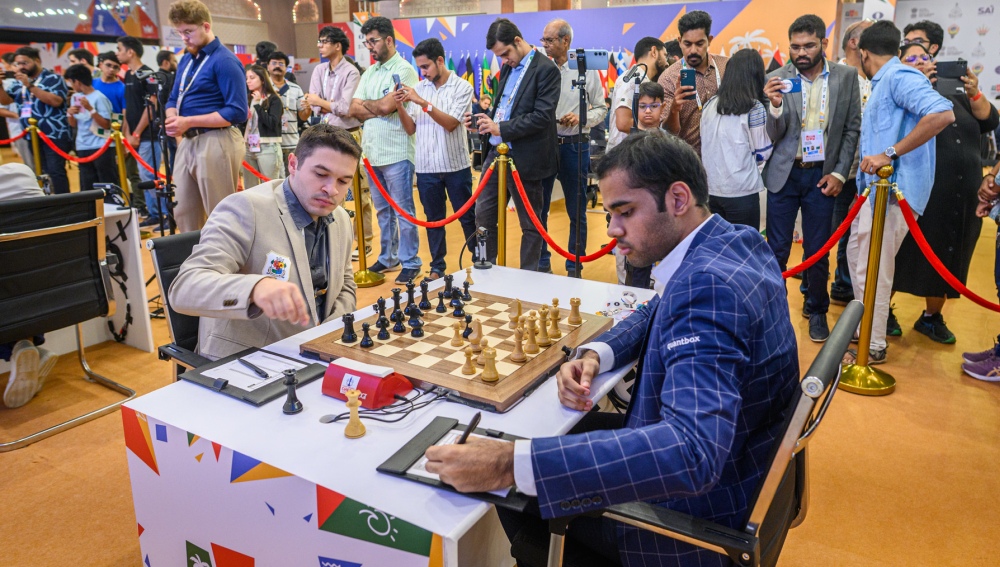
The second game delivered all the drama chess fans could hope for — successes, upsets, nerves, and suspense in equal measure. Leading the headlines was World Champion Gukesh D., who once again demonstrated impeccable form. Playing with Black, he convincingly overpowered Kazybek Nogerbek to secure his place in the third round. Moments later, Gukesh was greeted by hundreds of cheering fans waiting outside the playing hall — a testament to his growing global appeal and India’s passionate chess following. https://www.youtube.com/watch?v=3ZCVOl7ZMrI Joining him in the winners’ column were several other top favourites, including Arjun Erigaisi, Anish Giri, Wei Yi, and Vincent Keymer, all of whom delivered commanding performances to advance without the need for tiebreaks. However, not every top seed found smooth sailing. R. Praggnanandhaa, Nodirbek Abdusattorov, Shakhriyar Mamedyarov, and Hans Niemann were unable to finish off their opponents in the classical portion and will have to return tomorrow for what promises to be an intense day of rapid and blitz tiebreaks. Perhaps the biggest disappointment experienced Ian Nepomniachtchi, the two-time World Championship challenger, who suffered an early and unexpected exit. It was a stunning upset and one of the defining stories of the day. Another dramatic twist of the day came from Wesley So, whose premature exit shocked many. Facing Titas Stremavicius, an opponent rated more than 200 points lower, So found himself in a tense endgame while playing with the Black pieces. Under mounting time pressure, he resigned in what was actually a drawn position, overlooking a remarkable stalemate resource that would have saved the game. Other well-known names — including Ray Robson, Vassily Ivanchuk, David Navara, and Johan-Sebastian Christiansen — also bowed out of the competition, their World Cup dreams now on hold until the next edition in two years’ time. Let’s take a closer look at the action as the round unfolded. Inside the calm before the storm: Moments before Round 2 I usually arrive at the playing venue about twenty minutes before the start of each round. There’s something special about those quiet moments before the clocks begin to tick — the soft hum of concentration, the rustle of scoresheets, and the faint click of pieces being placed just so. While most grandmasters prefer to walk in during the last five minutes, a handful of players arrive early, savouring their own pre-game routines. At this level, arriving late is almost unheard of — not only would it bring a hefty fine, but it could even mean losing by forfeit. Among the early arrivals today were GMs Wesley So, Pranav V, Maksimovic, Lodici, and Yu Yangyi — each calmly settling in, preparing scoresheets, and collecting their thoughts for the battles ahead. A clash of generations: Vidit vs. Oro One of the earliest to take his seat was 12-year-old IM Faustino Oro, Argentina’s young prodigy. Oro, meticulous to the last detail, spent several minutes ensuring that each of his pieces sat perfectly centered on its square — a ritual of precision that mirrors his play. His opponent, India’s top GM Vidit Gujrathi, also arrived early, greeted the youngster warmly, adjusted his pieces, and then slipped into his familiar pre-game meditation: eyes closed, steady breathing, complete focus. Vidit enjoyed some extra encouragement today from his mother, who attended the round in a beautiful chess-themed sari, a touching symbol of support. Laughter, focus, and generations united Also among the early arrivals were elite grandmasters Anish Giri and Hans Moke Niemann. Rather than settling into their seats, the two shared a light-hearted moment, trading jokes and smiles in a brief escape from the tension that was soon to come. Their relaxed camaraderie offered a glimpse of the human side of competition — rivals on the board, but colleagues in a shared craft. A few boards away, GM Felix Blohberger exchanged greetings with his good friend GM Thai Dai Van Nguyen before slipping in his noise-cancelling earplugs — a now-familiar ritual that has become his signature. Away from the board, Blohberger is a rising figure in the online chess community: a respected ChessTuber whose thoughtful daily recaps give fans a unique window into the life and mindset of a professional player. Among the most respected presences in the playing hall was GM Shakhriyar Mamedyarov, a world-class competitor for over two decades and now a mentor to some of the brightest young talents in the game. One of his current protégés, 14-year-old Turkish GM Yağız Kaan Erdoğmuş, is also competing in this World Cup. The two arrived together, exchanged a few final words over opening ideas, and wished each other luck before heading to their respective boards — a quiet, meaningful moment that beautifully embodied the connection between chess’s great traditions and its promising future. The enigmatic legend: Vassily Ivanchuk Grandmaster Vassily Ivanchuk is a true legend of the chess world. Arguably one of the most experienced players in World Cup history — having competed in eight editions by most counts — “Chuki,” as he’s affectionately known, remains as unpredictable and captivating as ever. True to his unique rhythm, Ivanchuk typically arrives at the venue well before the round begins, but rather than sitting down immediately, he prefers to wander calmly along the side aisles, hands clasped behind his back, lost in thought. Perhaps this gentle ritual helps him settle his nerves and tune his mind for what lies ahead — another intense four- or five-hour battle over the board. As the final seconds ticked down and arbiters prepared to start the clocks, the atmosphere shifted — quiet intensity filling every corner of the hall. The calm before the storm was over. The games had begun. The ceremonial opening of the round As per tradition, Łukasz Turlej, the FIDE Secretary General, made the symbolic first move on board three — the game between GM Praggnanandhaa R (from Chennai, India) and GM Temur Kuybokarov (representing Australia). The ceremonial event also hosted Santosh Sukhadeve, IAS, who is the Sports Secretary for the Government of Goa, as the government representative for the occasion. Turlej is not
World Cup Round 2 Game 1: Gukesh debuts, Aronian and Wei Yi shine, Faustino continues to amaze
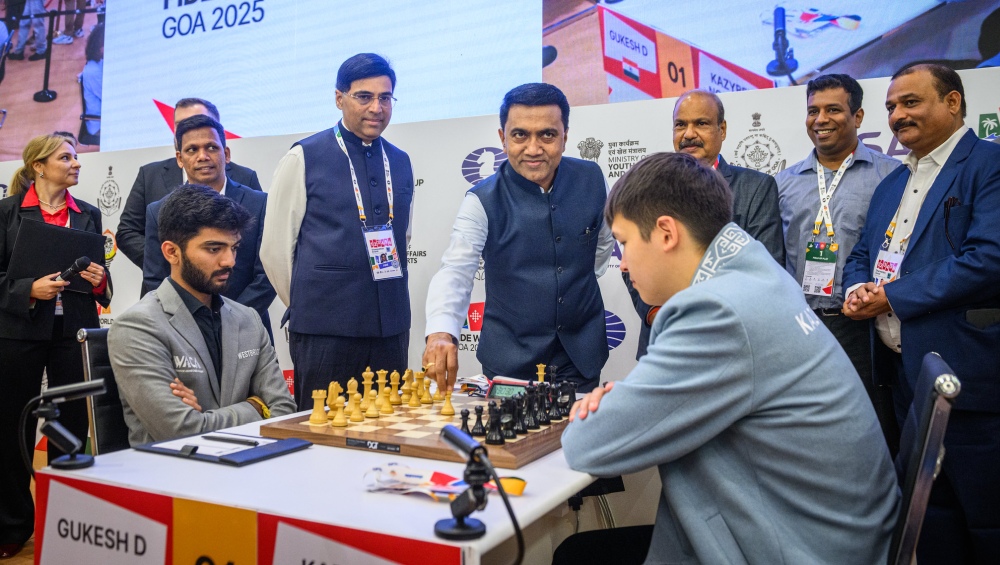
It was a huge day for Goa’s chess scene. The top fifty seeds, including World Champion Gukesh D, debuted this afternoon in the Baga Resort Rio playing hall, joining the seventy-eight qualifiers from the opening round. To honour the occasion, the state’s Chief Minister Dr. Pramod Sawant, accompanied by five-time former World Champion and FIDE Deputy President Vishy Anand, opened the round by performing the ceremonial first move on Gukesh’s board. Unfortunately for the number one seed, luck was not on his side this time. His opponent, GM Kazybek Nogerbek (2543) from Kazakhstan, held the draw with the Black pieces — not a result many can boast against the reigning World Champion. Before play began, both Anand and the Chief Minister attended a packed press conference. When asked for his top picks to win the event, Anand—as usual—was cautious, but he did point out that GM Levon Aronian “has already been enjoying Goa for the last week, so it’s quite clear that he is taking the event very seriously.” A fan’s perspective Before being a player or an announcer, I am, above all, a chess fan. One of the great perks of working as a FIDE press officer is the chance to walk around the playing area and watch, up close, the games of the best players in the world. Leaving aside Magnus Carlsen, Hikaru Nakamura, Fabiano Caruana, and Alireza Firouzja, who for one reason or another decided to skip the event, practically all the world’s top 100 are here. It’s a true who’s who of elite chess, and I don’t take for granted the privilege of being here to witness it all. Having covered chess for some time, there are only a handful of players I haven’t yet seen live. One of them is the American star Hans Moke Niemann — and he’s definitely taller than I imagined! It will be fascinating to see how he performs in his first World Cup appearance. Esipenko’s sparkling attack As expected at this level, most games ended in draws — I suspect many matches will go to tiebreaks. Still, a few players notched up early wins, mostly with the White pieces. The first decisive result came about two and a half hours into the session, when GM Andrey Esipenko (2693) defeated 2023 Baku World Cup semi-finalist GM Nijat Abasov (2587) in a dominant attacking display. Abasov had just played 17…Be7–d6, defending the pawn on e5. Esipenko thought for five minutes and unleashed a bolt from the blue: 18.Ba6!, threatening checkmate on b7. The bishop can’t be captured due to mate on a8, but Esipenko still had to calculate several defensive tries. Abasov responded with 18…c6, blocking the diagonal, but after 19.b5!, the attack became irresistible. The key variation: 19…bxa6 20.bxc6! Qc7 21.Qf5+ and White wins. In the game, 19…c5 20.b6! sealed Abasov’s fate, and he resigned a few moves later. Wei Yi strikes in style Among the later games, GM Wei Yi (2753)’s encounter with GM Kacper Piorun (2557) caught my attention. The Chinese prodigy—now a university graduate—has fully returned to professional chess, bringing back his trademark aggressive style. After 17…Bxe3, Piorun may have expected 18.Qxe3, aiming for simplification after 18…Qxe6 19.f4 Qb6! Instead, Wei Yi stunned with 18.Bf7+!! Kxf7 (18…Qxf7? 19.Qxe5+) 19.fxe3, pinning the queen and winning decisive material. In his postgame chat, Wei Yi said: “My opponent played the opening in a romantic style, like a puzzle. I haven’t been to India many times, but I really enjoy Goa. I think I prefer blitz and rapid formats, though—I spend too much time in classical games!” https://www.youtube.com/watch?v=TNc_7BhYfdQ Aronian’s beach vibes and brilliant finish A World Cup wouldn’t be complete without GM Levon Aronian (2728). A two-time champion—Khanty-Mansiysk 2005 (vs. Ponomariov) and Tbilisi 2017 (vs. Ding Liren)—Aronian is a master of knockout formats. In Goa, he started strongly, defeating Bengali IM Aronyal Ghosh (2520), in an attacking masterpiece that featured a sparkling piece sacrifice. Black had an extra piece but a shattered kingside and an out-of-play queen. Aronian’s finish was vintage brilliance: 25.Rg4+! Nxg4 26.Qxg4+ Kh8 27.Qd4+! f6 28.Qd2!, the key move, after which Black resigned. One pretty line runs: 28…Kh7 29.Re7+ Kg6 30.Qd3+ f5 31.Qxg3+ Kh5 32.Bd1 mate! Other highlights Other 2700+ favourites also began well, including Arjun Erigaisi (2773), Vincent Keymer (2755), Shakhriyar Mamedyarov (2742), Maxime Vachier-Lagrave (2737), Richard Rapport (2724), Javokhir Sindarov (2721), Vladimir Fedoseev (2720), and the newest member of the 2700+ club, Awonder Liang (2710). Liang’s opponent, Max Warmerdam, reached an equal position in a complicated Ruy Lopez battle but made the wrong choice at the critical moment. Black had to decide which pawn to take—f2 or b2? After the correct 37…Rxb2! 38.f6 Qxf6, White has to force a draw by perpetual check: 39.Rxf8+ Kxf8 40.Qc8+ Ke7 41.Qc7+ Ke6 42.Qc8+ Kd6 43.Qc6+. Instead, Warmerdam captured the “wrong” pawn with 37…Rxf2??, which failed to 38.f6! g6 (alas, 38…Qxf6 does not work anymore, as after 39.Rxf8+ Kxf8 40.Qc8+ Ke7 41.Qc5+, White wins the f2-rook) 39.Qg5!, threatening Qh6. Black had to give up the exchange with 39…Rxf3 and was checkmated on move 60. Among relatively surprising results include: Ivan Zemlyanskii (2596) defeated Ray Robson (2664). Georg Meier (2596) took down Volodar Murzin (2664), the reigning World Rapid Champion, with Black. But remember — it’s a two-game match, and anything can happen tomorrow. Finally, 12-year-old Argentine prodigy Faustino Oro continues to impress, holding elite Indian GM Vidit Santosh Gujrathi (2716) to a draw with Black from the position of strength. Looking ahead Round one of the Goa World Cup has set the stage for thrilling tiebreaks and surprises. With the stars in attendance, the beaches buzzing, and the boards on fire, the chess world will be watching Goa very closely in the coming days. Game 2 of Round 2 begins on November 5 at 3 PM local time. The action can be followed live on the FIDE YouTube Channel, featuring expert commentary by GMs Evgenij Miroshnichenko and Jan Gustafsson. To watch the games in person, tickets can be purchased [HERE] Official website: worldcup2025.fide.com/ Written by IM Michael Rahal Photos:
3rd FIDE Council meeting 2025: List of decisions
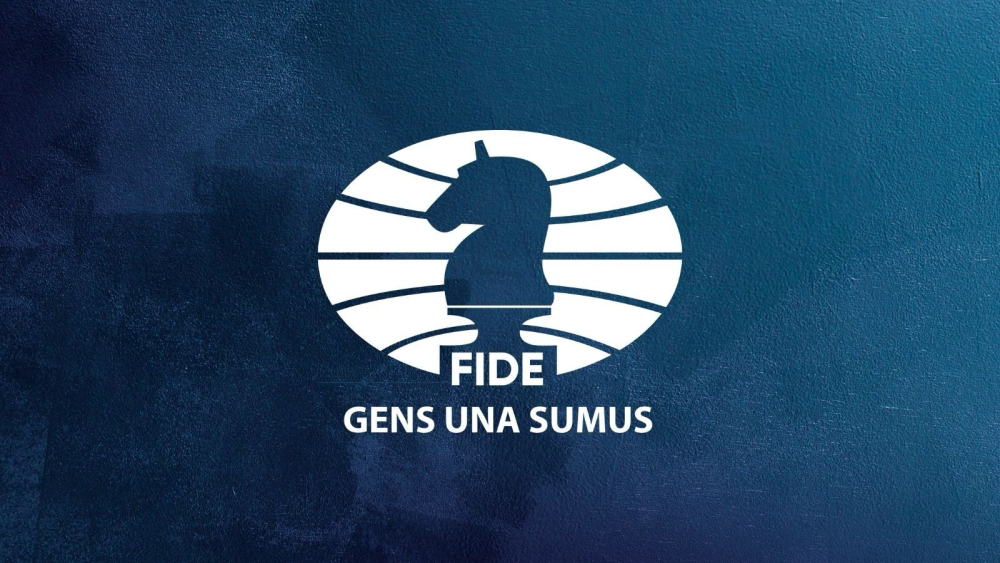
3rd FIDE Council meeting October 28, 2025 Online List of decisions CM3-2025/01 To note President’s report. CM3-2025/02 To approve Treasurer’s report. CM3-2025/03 To support in principle the amendments to the art. 17.6. of the FIDE Charter. To ask the Constitutional Commission to draft the final version of the amendments including the transition period for implementation of the amendments. CM3-2025/04 To support in principle the amendments to the FIDE Electoral Rules. To ask the Constitutional Commission to draft final version of the amendments. CM3-2025/05 To note the Global Strategy Commission’s report. CM3-2025/06 To note the Arbiters’ Commission’s report. CM3-2025/07 To approve the recommendations of the Arbiters’ Commission on Seminars, Classification upgrades, Amendments to the lecturer list, FA norms and titles. CM3-2025/08 To note the Qualification Commission’s report. CM3-2025/09 To approve the recommendations of the Qualification Commission on titles. CM3-2025/10 To approve the Qualification Commission’s proposal regarding the Table of Direct Titles (relating to events for people with disabilities and clarifications on the names of school events). CM3-2025/11 To note the decision of the Qualification Commission regarding the Complaint Regarding Non-Rating of FIDE-Registered Tournaments Held in Bogotá, Colombia (2025). CM3-2025/12 To delegate to the President the right to confirm direct titles regarding the 23rd ASEAN Chess Championships taking into account the advisory opinion of the Qualification Commission. CM3-2025/13 To approve the recommendations of the Trainers’ Commission on titles and Academies. CM3-2025/14 To approve the recommendations of the Events Commission on titles. CM3-2025/15 To approve the recommendations of the Chess in Education Commission on titles. CM3-2025/16 To approve the recommendations of the Fair Play Commission on titles. CM3-2025/17 To approve the proposal of the Technical Commission. CM3-2025/18 To note the Commission’s for Women’s Chess report. CM3-2025/19 To note Continental Presidents’ reports. CM3-2025/20 To recommend the membership application of the Guinea Chess Federation for the approval by the FIDE General Assembly 2025. CM3-2025/21 To recommend the membership application of the Marshall Islands Chess Federation for the approval by the FIDE General Assembly 2025. CM3-2025/22 To recommend the membership application of the Kiribati Chess Federation for the approval by the FIDE General Assembly 2025. CM3-2025/23 To note the report of the Reverse Delegate for the Burkina Faso Chess Federation. CM3-2025/24 To recommend the FIDE General Assembly to expel the current Burkina Faso Chess Federation and to admit new membership application from the Burkina Faso Chess Federation. CM3-2025/25 To note the report of the Reverse Delegate for the USVI Chess Federation. CM3-2025/26 To recognise the recent elections held by the USVI Chess Federation. CM3-2025/27 To note the report of the Reverse Delegate for the Syria Chess Federation. CM3-2025/28 To approve the introduction of the FIDE annual awards. CM3-2025/29 To preliminarily approve the Agenda of the FIDE General Assembly 2025. 3rd FIDE Council meeting 2025 – List of decisions (PDF)
FIDE Word Cup: 12-year-old IM Faustino Oro steals the show in Goa tiebreaks
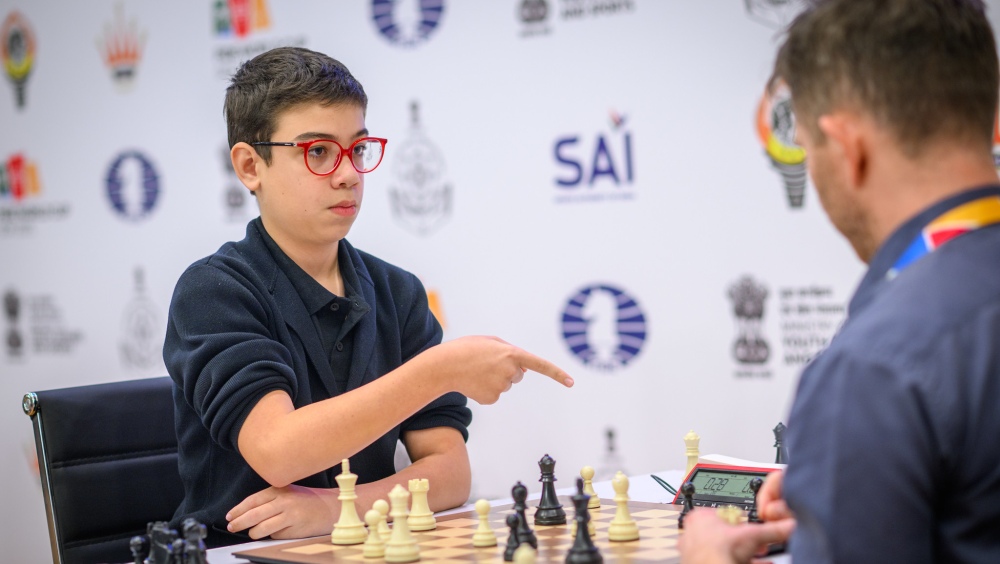
The nerve of the tiebreaks Blitz and rapid tiebreakers are nerve-racking spectacles. In rapid games, players have enough time to think, plan, and avoid blunders, yet must still manage their time carefully. It’s a delicate balance between classical depth and blitz speed. Blitz, on the other hand, is fast, intuitive, and electric — a format where players rely on instinct, pattern recognition, and split-second calculation. Common online and in casual play, blitz demands confidence, courage, and above all, emotional control under pressure. Few embody these qualities better than 12-year-old Argentinian IM Faustino Oro. The prodigious talent, already known for online victories against Magnus Carlsen and Hikaru Nakamura, showed maturity beyond his years by defeating seasoned GM Ante Brkic in Goa today. The round was ceremonially opened by Sanjiv M. Gadkar IAS, Secretary Protocol, Government of Goa, on Board One, where GM Robert Hovhannisyan faced FM Kavin Mohan. For tomorrow’s all-important second round, the Chief Minister of Goa is expected to make the honorary first move for World Champion Gukesh D. Rapid rounds: Surprises and systems Out of twenty matches, fourteen were decided within the first two rapid games — overturning many pre-round predictions. Most rating favourites advanced, though not all without a fight: six matches ended 2-0, and eight concluded 1.5-0.5. A noticeable difference from the classical portion was the choice of openings. Many players opted for flexible “systems” such as the Colle, London, and Anti-Sicilian setups — less theoretical but highly dynamic, well-suited to faster time controls and reduced defensive resources. With these results, Round 2 is set. All fifty seeds have arrived, ready to enter the action tomorrow afternoon — a round that promises fireworks and fascinating matchups. Let’s look at this afternoon’s action in more depth. The early qualifiers The first player to qualify under the 15+10 rapid section was GM Sunilduth Lyna Narayanan (2617). The strong Kerala Grandmaster, currently ranked India’s number seventeen, defeated IM Steven Rojas Salas (2413) of Peru by a clean 2-0. A 52-move grind with Black in the first game left Rojas Salas struggling, and Narayanan finished him off in style with a 22-move miniature in the second, capitalizing on a major blunder. According to Theophilus Wait, Lichess Operations Director present in Goa, Narayanan warmed up for the day with over fifty bullet games online: “I play a lot of bullet — that’s one of my ways to get in shape. I play fast and check a bunch of lines with the computer later.” It seems the routine paid off handsomely. Other clear 2-0 victories included: GM Jorge Cori (2601, Peru) defeating IM Aldiyar Ansat (2470, Kazakhstan). GM Temur Kuybokarov (2535, Australia) beating GM Jan Subelj (2532, Slovenia) in a match highlighted by a brilliant checkmating finish. Kuybokarov sealed the game with 49…Nh3+ 50.Kh2 Nf2+ 51.Kg1 Rh1+! 52.Kxf2 Qxe3 mate 0-1. GM Tin Jingyao (2583, Singapore) defeating IM Jegor Lashkin (2492, Moldova). GM Ghosh Diptayan (India, 2564) overcoming GM Peng Xiongjian (2520, China) by the same score. IM Bojan Maksimovic (2532, Bosnia) eliminating GM Emre Can (2541, Turkey) — both classical games had been drawn. Narrow escapes and determined youngsters Eight matches ended 1.5-0.5, mostly favouring higher-rated players. Among the standouts was FM Kavin Mohan (Malaysia, born 2011), who drew both classical games against GM Robert Hovhannisyan (2629) before narrowly losing in the rapid portion — a superb showing for the 14-year-old. Elsewhere, GM Alisher Suleymenov (2491, Kazakhstan) defeated GM Arturs Neiksans (2585, Latvia), while GM Denis Makhnev (2525, Kazakhstan) ousted GM Diego Flores (2563, Argentina) winning by the same margin. After his elimination, Neiksans congratulated his opponent and humorously announced his return to the commentary desk: The 10+10 Rapids: One match decided, five headed to blitz Six matches advanced to the second two-game rapid set (10+10). The play was fiercely balanced, with only IM Aronyak Ghosh (2520, India) managing to win both games and advance. His opponent, GM Mateusz Bartel (2575, Poland), fought hard and even gained attacking chances in the final game before a sudden blunder ended his run: Bartel’s 20.Qf3?? allowed 20…Nh4, a double attack that forced immediate resignation. Blitz deciders: Youth and nerves of steel With six games already behind them, players entered the blitz tiebreaks (5+3) — a pure test of energy, nerves, and composure. All five matches were decided at this stage, featuring both upsets and heroic efforts. The headline story came from IM Faustino Oro (Argentina, 12 years old), who won both blitz games to qualify for Round 2. Overjoyed, “Fausti” was whisked off for a fair-play check before returning for a quick post-match chat: “I’m so happy to have qualified. It’s been a very tough match,” he said. “I missed a key tactic in the final game, but luckily for me the position was still tricky.” https://www.youtube.com/watch?v=thmg-CpdxU0 Elsewhere, GM Daniil Yuffa (2618, Spain) survived a marathon match against IM Shiyam Thavandiran (Canada, 2400), eventually clinching both blitz games but acknowledging his opponent’s resilience. GM Max Warmerdam (2577, Netherlands) also needed blitz to overcome GM Lalit Babu M R (2506, India), in a match where momentum swung dramatically. Two other tightly contested duels saw GM Kazybek Nogerbek (2538, Kazakhstan) defeat GM Raja Rithvik (2541, India), and GM Ahmed Adly (2589, Egypt) edge past GM Karen Grigoryan (2481, Armenia) — the latter still a formidable competitor and former 2650-rated player. Looking ahead The first day of tiebreaks offered everything — drama, blunders, brilliance, and youthful audacity. With all 50 seeds now entering the fray, Round 2 promises high-voltage encounters as established stars meet fearless challengers. Goa’s World Cup is heating up, and if today’s rapid and blitz battles are any indication, the days ahead will be nothing short of spectacular. Game 1 of Round 2 begins on November 4 at 3 PM local time. The action can be followed live on the FIDE YouTube Channel, featuring expert commentary by GMs Evgenij Miroshnichenko and Jan Gustafsson. To watch the games in person, tickets can be purchased [HERE] Official website: worldcup2025.fide.com/ Written by IM Michael Rahal Photos: Michal Walusza and Eteri
FIDE World Cup R1 Day 2: Favourites advance, but drama awaits in the tiebreaks
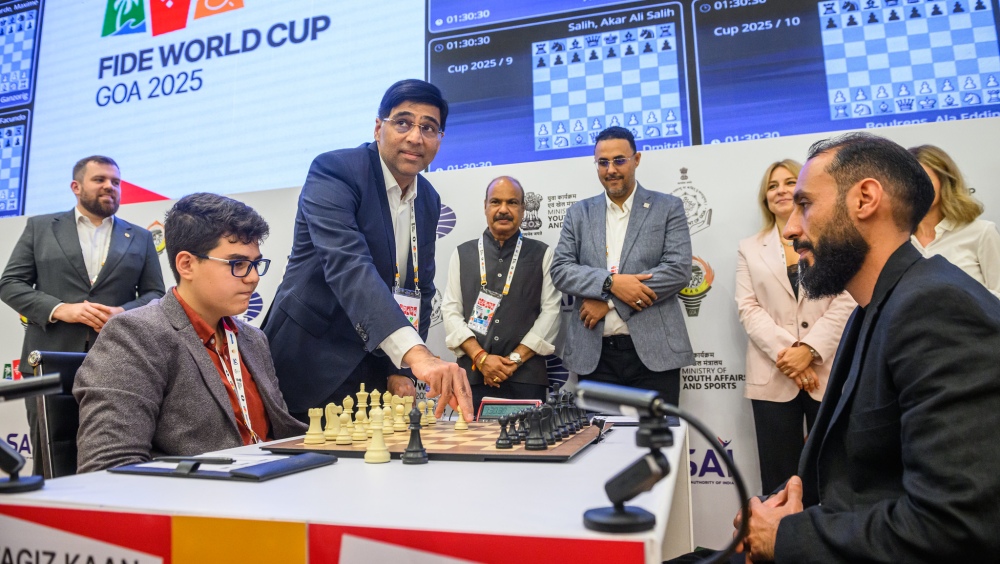
With the gradual arrival of most of the top 50 seeds, the second game of round one commenced on time in the convention hall of the Baga Resort Rio in Goa. Among others, I spotted elite 2700+ GMs Nodirbek Abdusattorov, Shakhriyar Mamedyarov, Javokhir Sindarov, Vladimir Fedoseev, and Jorden van Foreest acclimatising to the new location. I also had the pleasure of having lunch with the 13th seed, Le Quang Liem from Vietnam. Commentator Jan Gustafsson noted that players might need a bit more time to adapt: “Two days seem to be cutting it rather close if you arrive from a distant time zone.” Top Indian Olympiad player Vidit Gujrathi obviously doesn’t have this disadvantage, though he still enjoyed a relaxed stroll around the playing hall toward the end of the round. More top players are expected to arrive throughout the day, with the rest of the field assembling at the venue tomorrow — eager to learn who they will face in the second round of the knockout. All of them, including World Champion Gukesh D., will join the action in round two. The venue welcomed a very special guest to perform the ceremonial first move. Vishy Anand — former five-time World Champion and current FIDE Deputy President — opened the round by playing 1.c4 for Turkey’s Yagiz Kaan Erdogmus on board one. The move was met with 1…e5, played on behalf of his opponent, Abugenda Nagi of Libya, by Mr. Ali Fouzi, President of the Libyan Chess Federation. Just fifteen minutes into the playing session, three players had already secured qualification to the second round. Amin Bassem, Étienne Bacrot, and Nikita Petrov were each awarded victories by forfeit after their opponents failed to appear for their two-game matches. Barbadian International Master Orlando Husbands, however, arrived too late for the first game of his match but eventually made it to the venue and put his opponent — top German Grandmaster Frederik Svane (2640) — to the test. Though he ultimately lost and was eliminated, he fought valiantly and made his presence felt on the board. Over the following hours, the hall was filled with deep concentration. As I moved among the tables in search of the most compelling encounters, the atmosphere was almost tangible — focus at 100%, and the tension of high stakes evident on every face. The first decisive result was confirmed shortly after the midpoint of the round. American 15-year-old prodigy Andy Woodward scored the opening victory of the afternoon, defeating India’s Gusain Himal with a convincing 2–0 overall score. Playing with the black pieces, Woodward had already seized the initiative. With his last move, 19…Ngf4, he attacked the pawn on g2. White needed to eliminate the knight immediately, but after just three minutes of reflection, Gusain blundered with 20.Kf1?, allowing 20…Nxg3+ 21.fxg3 Nh5!, creating the decisive threat of 22…Nxg3, which would win material. The strength of the bishop on a7, dominating all the dark squares around White’s king, became apparent. Recognizing the hopelessness of his position, Gusain resigned soon after. With this victory, Woodward advances to face a formidable opponent in round two — Austria’s Kirill Alekseenko (rated 2679). As more results began to come in, attention turned to one of the most anticipated encounters of the day — the game featuring one of the youngest participants in the tournament, 14-year-old Argentinian prodigy IM Ilan Schnaider (rated 2401), against former European Champion Aleksandar Indjic, a strong Serbian Grandmaster rated 2635 — and, at 6’8″, arguably the tallest GM in the world! Having lost the first game, Schnaider needed a victory to force a tiebreak. After the opening, he had exactly the kind of dynamic position he was hoping for. The Serbian’s king on d7 was in serious trouble in this chaotic position, clearly favorable for White. Schnaider spent nearly fifteen minutes here, weighing his attacking options, before deciding on 17.Nf4, and ended up just slightly better. However, he missed a golden opportunity to press for the full point. Instead the move played, he could have launched a powerful assault with 17.Qa4+! The key idea is after 17…c6 fails to 18.Be7! attacking the queen and preparing dangerous follow-ups such as Qa3–d6 or Re4. It’s likely that a player of Schnaider’s caliber examined this line but dismissed it due to the absence of an immediate tactical breakthrough. Needing only a draw to advance, Indjic chose to simplify the earliest opportunity and calmly secured qualification after a draw in a double-rook endgame. Yesterday’s biggest upset came when Chilean GM Cristóbal Henríquez Villagra unexpectedly lost on time in a theoretically drawn endgame against an opponent rated 150 points lower. Determined to make amends, he struck back today with an impressive attacking victory that forced a tiebreak. Henríquez Villagra concluded the game in style with the precise and elegant 45.Re8+!. The point is simple yet beautiful: after 45…Qxe8, White delivers a classic “Dovetail Mate” with 46.Qd6#. A clean and instructive finish — and a fitting way to erase the memory of yesterday’s disappointment. Combination of the day It’s always difficult to single out the best combination of the day — with so many great games unfolding simultaneously, it’s nearly impossible to keep track of them all. Nevertheless, Spain’s number one, GM David Antón Guijarro, secured his 2–0 qualification to the next round with a brilliant queen sacrifice against Angolan IM David Silva. Silva has just played 31.Rea1, threatening Ra7 and giving up his bishop on g5, in order to seize control of the seventh rank and threaten the f7-pawn. Antón thought for a few minutes before confidently accepting the challenge with 31…Bxg5. After 32.Ra7, he stunned the spectators by sacrificing his queen: 32…Qxa7! 33.Rxa7 Rf6!, attacking White’s queen and turning the tables completely. After 34.Qd1 Rxf2, Silva resigned. A spectacular illustrative line might be 35.h3 Rxf1! 36.Bxf1 Be3+ 37.Kg2 Bxe4+, with a decisive attack. It’s clear that Antón had foreseen this entire sequence before giving up his queen — a testament to both courage and calculation. Meanwhile, the recent Women’s World
Ljubomir Ljubojević turns 75
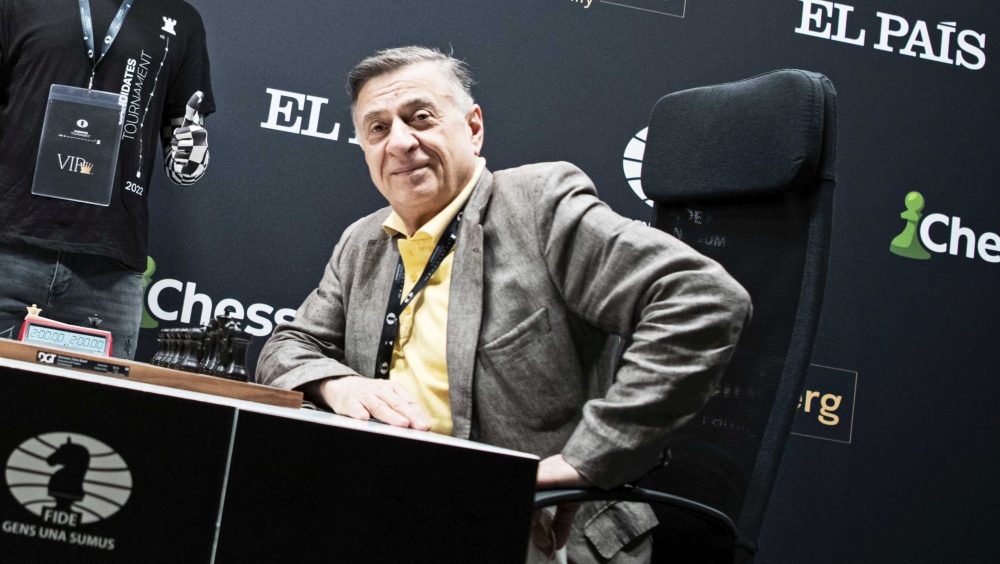
Photo: Stev Bonhage Today, the one and only Ljubomir Ljubojević turns 75. A brilliant star—once ranked world #3, and arguably the strongest of all when on fire. Colorful and explosive, he was never built for steady, pragmatic success at the board—but oh, how high he soared! Debuting at not quite 23 years old in the Interzonal in 1973, Ljubomir started with 5.5 out of 6, then reached 8 out of 11, though he missed victory in his key game against rival Lajos Portisch. And, as happened to him more than once — and would again — he tragically rushed in the famous game against Bronstein, with more than two hours on his clock versus just a few minutes for his opponent. Instead of a win came a painful loss, and Ljubojević cracked, finishing in the middle of the standings. Photo: Douglas Griffin on X That failure seems to have left an indelible mark on the sensitive grandmaster. Despite regularly ranking among the world’s top ten, time after time he was overtaken by more determined—and sometimes simply luckier—colleagues, and he never qualified for the Candidates. Still, looking at the ever-cheerful grandmaster, no one would have said he was unhappy. The soul of any chess gathering—vivid, emotional, fluent in five languages and quick to analyze in five more—he was a welcome guest at every elite tournament of his era. In the 1983 FIDE rating list, Ljubojević ranked third in the world, yet one senses that wasn’t what mattered most to him. What truly captivated him were the tournaments themselves—their unique atmosphere. From Belgrade, Bugojno, and Nikšić to Tilburg, Wijk aan Zee, and Linares (where he settled after marrying in the mid-1980s), Ljubojević thrived. Bugojno 1982. Ljubojević is far left in the first row. Photo: http://www.jovanpetronic.com By then, new heroes had taken the stage—Kasparov and his generation—but “Ljubо,” as the entire chess world affectionately called him, did not yield ground. Far from it: he was the only player besides Karpov to share first place with Kasparov in a super-tournament—Brussels 1987 (8.5/11, ahead of the entire elite and two Belgian masters) and the World Cup stage in Barcelona 1989 (11/16, undefeated!). In those events, he was both dazzling and pragmatic, and it seemed the younger players would not soon surpass the maestro—not yet forty at the time. But then, suddenly, it was over. There would still be a solid showing at the 1990 Manila Interzonal, some brilliant games in Belgrade super-tournaments, and worthy performances for the Yugoslav and later Serbian national teams. For many years, Ljubо played in Monaco at Oosterom’s tournaments—the organizer had great affection for the charismatic grandmaster—but top-level chess effectively ended for Ljubojević in the early 1990s, just as a powerful new wave of players emerged. The bohemian, passionate chess—one in which Ljubojević had few equals—was fading away. And he didn’t know how to play any other kind. Since then, he has more often appeared as an honored guest or commentator. Still expressive as ever — when we spoke a couple of years ago, it was hard to believe that this energetic, though no longer young, man was already in his seventies. That expressiveness has never left him; it shines through everything he does, especially his analysis. I remember talking with Ljubо back in the late 1990s — and I wouldn’t say the gray hair had changed him one bit. It’s only a pity that post-game analysis, at the board or even blindfold, has become such a rarity. During the 2022 Candidates Tournament in Madrid, you could catch Ljubojević at breakfast passionately defending his view — in one of his countless languages — against anyone, even the highest-rated players. You could see he still felt like a fish in water in this environment. To me, though, Ljubojević is more like a great bird, still soaring. May your flight be long, Ljubо! Emil Sutovsky, FIDE CEO
FIDE strengthens ties with IOC, UEFA and ARISF
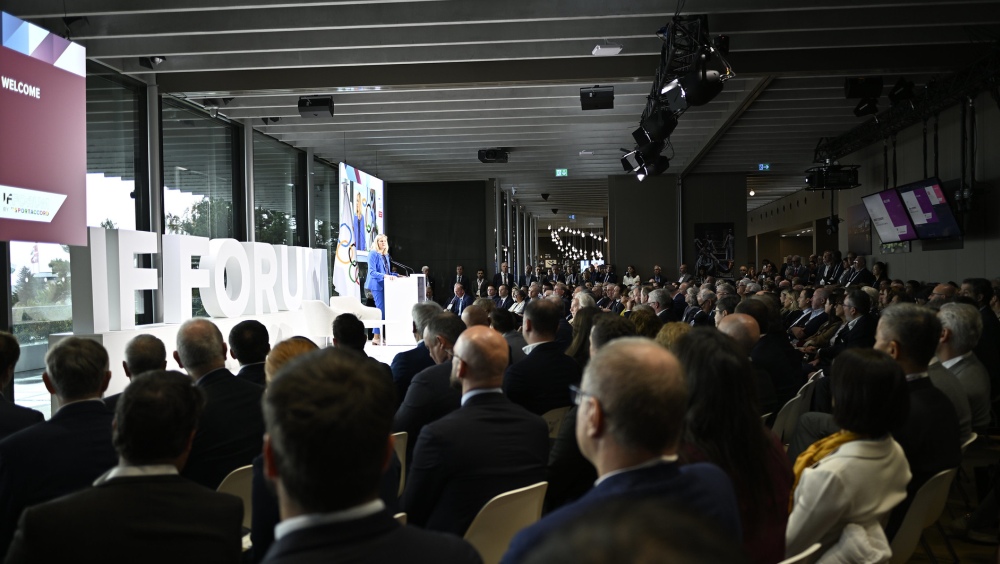
FIDE President Arkady Dvorkovich held meetings with leaders of the IOC and UEFA in Switzerland, and participated in the ARISF General Assembly and the IF Forum. At the end of October FIDE President Arkady Dvorkovich had a series of meetings and engagements in Switzerland, successfully advancing the integration of chess into the wider sports community. Starting from 27 October, Dvorkovich represented FIDE at the Association of IOC Recognised International Sports Federations (ARISF) General Assembly which took place at the Olympic Museum in Lausanne, Switzerland, reaffirming the central role of recognised federations within the Olympic Movement. FIDE is one of 39 International Federations recognised by the IOC and listed among the members of (ARISF). Together with Grandmaster Mohammed Al-Mudahka, the President of the Qatar Chess Association, Dvorkovich took part in the IF Forum, which focused on new global realities facing sport and sports organisations. Organised by SportAccord – which brings together stakeholders representing over 120 International Federations governing Olympic and non-Olympic sport – the event is the world’s most influential gathering in global sport. Dvorkovich also met with representatives from the IOC and other international sports bodies, where agreements were made to further integrate chess into global sports activities, including those of the International School Sport Federation (ISF). At UEFA headquarters, Dvorkovich met with President Aleksander Ceferin. They discussed future cooperation and the potential for innovative sport events combining chess and football, leveraging the mass appeal of both sports to reach new audiences. Strengthening ties with local authorities, Dvorkovich also met with leaders of Canton Vaud in Lausanne, where FIDE is headquartered. “It was a very intense few days – we had a lot of productive meetings with representatives from the world of sports and discussed new projects which will make FIDE more involved with and more prominent in the wider world of sports,” FIDE President Arkady Dvorkovich said. “Of course, during this time we also had our regular activities, such as the Council meeting, which was held online. We are continuing to work hard on opening new links and creating new opportunities for the world of chess, and I am hopeful we will have more great news to share in the near future,” Dvorkovich added.
Winners crowned at FIDE World Senior Individual Championships 2025
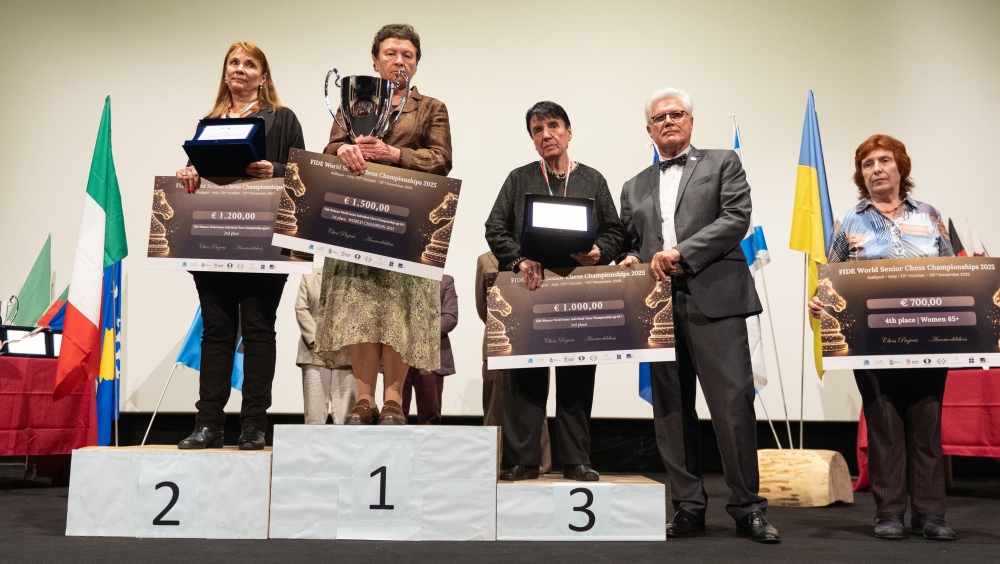
The record-breaking FIDE World Senior Individual Chess Championships 2025 concluded in Gallipoli, Puglia, Italy, after eleven intense rounds, with winners emerging in all four sections. GM Victor Mikhalevski (Israel) came out on top in the 50+ Open. Heading into the final round tied for the lead with GM Mikheil Kekelidze (Georgia) on 8.5/10, he scored a crucial victory over IM William Paschall (USA) to secure the title, while his rival could only manage a draw with GM Paul Motwani (SCO). Kekelidze took silver with 9/11, while GM Michele Godena edged out GM Murtas Kazhgaleyev for the bronze thanks to his victory in their direct encounter. Both the champion and the runner-up finished the event undefeated. Final standings 50+ Open The 65+ Open was the most tightly contested of the four tournaments. Four players—Alexander Reprintsev (UKR), Christian Maier (GER), Zurab Sturua (GEO), and Evgenij Kalegin (FIDE)—entered the final round sharing the lead on 8/10. When all four drew their games, IM Mark Ginsburg (USA) and GM Nikolay Legky (France) caught up by notching victories. The Buchholz tiebreak favored Alexander Reprintsev, who captured the gold medal, with Zurab Sturua and Christian Maier completing the podium. Final standings 65+ Open GM Ketevan Arakhamia-Grant (SCO) delivered a commanding performance in the 50+ Women’s section, scoring 8.5/11. The native of Georgia seized the lead in Round 5 and never looked back, clinching the title with a round to spare. Top seed GM Pia Cramling (SWE) and WGM Maritza Arribas Robaina (CUB) finished a full point behind the champion, tying for second place. The Swede took the silver medal as the winner of their direct encounter. Final standings 50+ Women WGM Galina Strutinskaia (FIDE) dominated the 65+ Women’s tournament. Scoring a remarkable 10.5/11, the fourth seed conceded just a single draw to her opponents and secured the title with a round to spare. Despite losing to the champion in Round 6, Marina Makropoulou finished strongly with two victories to claim silver with 7.5/11. Nona Gaprindashvili (GEO) and Larisa Khropova (FIDE) scored the same number of points, with the legendary Georgian champion rounding out the top three. Final standings 65+ Women The closing ceremony was held in Gallipoli’s historic Schipa Theatre, attended by Patrick van Hoolandt, Chair of the Appeals Committee; Yana Sidorchuk, FIDE Technical Delegate; organizers Cristina Pernici Rigo (Arcoworldchess) and Matteo Zoldan (Chess Projects); and several guests of honor. These included Pierluigi Piscopo, Counselor of the Italian Chess Federation; and Anio Iannuzzielo, Director of the Grand Hotel Costa Brada. The ceremony began with a minute of silence in memory of GM Daniel Naroditsky, who passed away at the end of October. It then continued with a performance by the multi-talented chess player and singer Nathan Resika, who delighted the audience with arias from Bizet, Verdi, and Mozart. The award ceremony followed, with the top finishers receiving trophies, medals, and symbolic checks. Official website: worldseniorchampionship2025.com/

